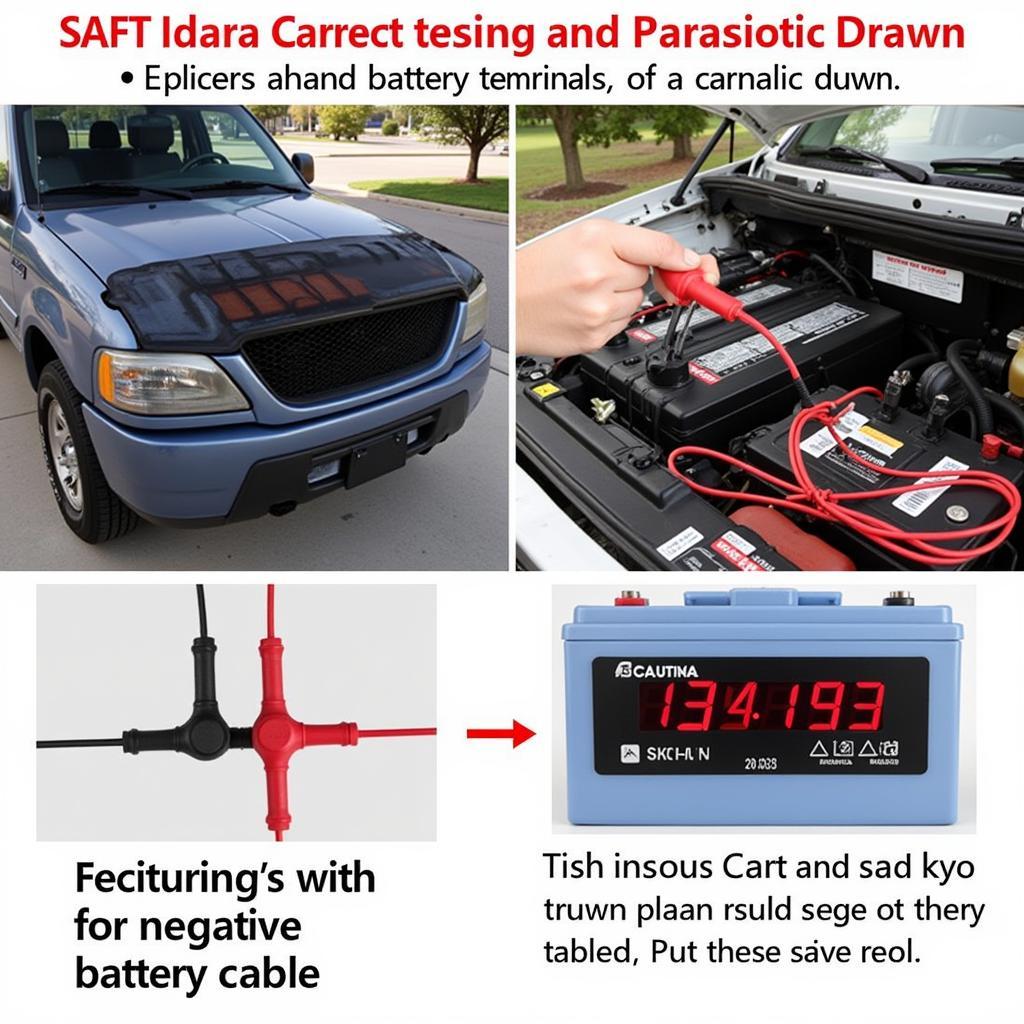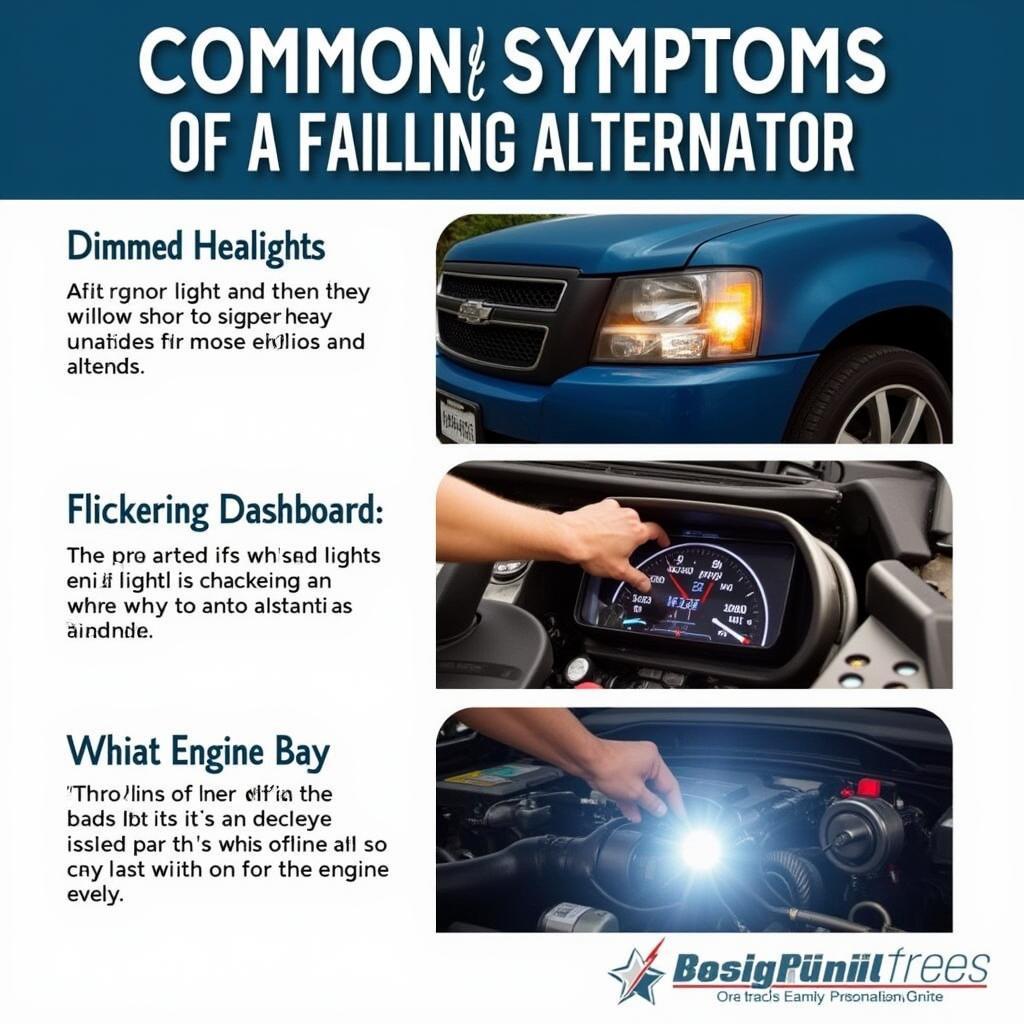A dead truck battery is a frustrating experience, especially when it happens repeatedly. If your truck battery won’t stay charged, you’re not alone. This problem is common, and several factors can contribute to it. This guide will help you diagnose the issue and provide potential solutions, from simple DIY fixes to more complex repairs requiring professional assistance.
Common Reasons Your Truck Battery Won’t Hold a Charge
There are several reasons why your truck battery might be draining quickly. Identifying the culprit is the first step towards a solution. These common issues range from simple fixes like loose connections to more complex problems like a faulty alternator.
Parasitic Drain: The Silent Battery Killer
A parasitic drain is a constant draw of power from your battery even when the ignition is off. This can be caused by faulty wiring, aftermarket accessories, or even a glove compartment light left on. Diagnosing a parasitic drain requires a multimeter and some patience.
- Step 1: Disconnect the negative battery cable.
- Step 2: Connect the multimeter in series between the negative battery cable and the negative battery terminal.
- Step 3: Observe the multimeter reading. A reading of more than 50 milliamps suggests a parasitic drain.
- Step 4: Systematically remove fuses one by one while observing the multimeter. A significant drop in the reading indicates the circuit causing the drain.
 Testing for parasitic drain in truck battery
Testing for parasitic drain in truck battery
Failing Alternator: The Powerhouse Problem
The alternator is responsible for recharging the battery while the engine is running. A failing alternator won’t charge the battery properly, leading to a continuous drain and eventual failure. Symptoms of a failing alternator include dimming headlights, flickering dashboard lights, and a whining noise from the engine bay.
 Symptoms of a Failing Alternator
Symptoms of a Failing Alternator
Old or Damaged Battery: Time for a Replacement?
Sometimes, the simplest answer is the right one. An old or damaged battery simply won’t hold a charge. Physical damage, such as cracks or bulges, is a clear sign of a failing battery. Even without visible damage, batteries have a limited lifespan.
Loose or Corroded Battery Terminals: A Simple Fix
Loose or corroded battery terminals can prevent the alternator from properly charging the battery. Check the terminals for any signs of corrosion (a white, powdery substance). Clean them with a wire brush and baking soda solution if necessary. Ensure the terminals are tightly connected.
How to Fix a Truck Battery That Won’t Stay Charged
Once you’ve identified the problem, you can begin to address it. Some issues, like cleaning corroded terminals, are simple DIY fixes. Others, like replacing an alternator, might require professional assistance.
DIY Fixes for a Draining Truck Battery
- Clean Battery Terminals: As mentioned above, this simple step can often resolve charging issues.
- Check and Tighten Connections: Ensure all battery cables and connections are secure.
- Remove Unnecessary Accessories: Aftermarket accessories, especially those improperly installed, can drain your battery.
When to Seek Professional Help
If you suspect a failing alternator, a parasitic drain that you can’t locate, or if your battery continues to drain after trying the DIY fixes, it’s time to seek professional help. A qualified automotive electrician can diagnose the problem accurately and perform the necessary repairs.
“A common mistake truck owners make is ignoring the early signs of a failing battery or alternator. Regular checks and maintenance can prevent costly repairs down the road.” – John Doe, Certified Automotive Electrician
Preventing Future Battery Problems
Regular maintenance is key to preventing future battery issues. Here are a few tips to keep your truck battery healthy:
- Regularly test your battery: A simple battery test can identify potential problems early on.
- Limit short trips: Short trips don’t give the alternator enough time to fully recharge the battery.
- Turn off all accessories when the engine is off: This includes lights, radio, and any aftermarket accessories.
Conclusion
A truck battery that won’t stay charged can be a nuisance, but it’s often a solvable problem. By understanding the common causes and using the troubleshooting tips outlined in this guide, you can identify the issue and take the appropriate action. Whether it’s a simple cleaning or a more complex repair, addressing the problem promptly can save you time, money, and frustration. Regular maintenance and preventative measures will ensure your truck battery stays charged and reliable for years to come.
FAQ
-
How long should a truck battery last? Typically, a truck battery lasts between 3 and 5 years.
-
Can I jump-start my truck if the battery is completely dead? Yes, you can jump-start your truck using jumper cables and another vehicle with a working battery.
-
Is it safe to drive with a bad alternator? No, driving with a bad alternator can damage other electrical components and leave you stranded.
-
What are the signs of a parasitic drain? Signs of a parasitic drain include a dead battery after sitting for a while, clicking sounds when trying to start, and dimming headlights.
-
How much does it cost to replace a truck battery? The cost of a new truck battery varies depending on the type and size, but it typically ranges from $100 to $300.
-
How often should I have my truck battery tested? It’s a good idea to have your truck battery tested every six months, especially during extreme temperatures.
-
Can I replace my truck battery myself? Yes, replacing a truck battery is a relatively simple DIY task.
